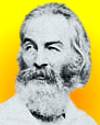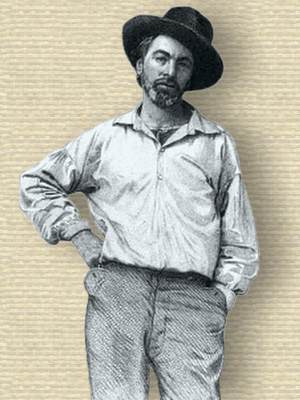 (source)
(source)
|
Walt Whitman
(31 May 1819 - 26 Mar 1892)
American poet, journalist and essayist who is considered one of America’s most important poets. He spent much of his career as a journalist, and editing newspapers. Meanwhile, Whitman developed his own style of poetry, first self-published in Leaves of Grass (1855). This first edition included the poem, 'I Sing the Body Electric'.
|
Science Quotes by Walt Whitman (29 quotes)
[T]here shall be love between the poet and the man of demonstrable science. In the beauty of poems are the tuft and final applause of science.
— Walt Whitman
In Walt Whitman and William Michael Rossetti (ed.), 'Preface to the First Edition of Leaves of Grass', Poems By Walt Whitman (1868), 46.
A noiseless, patient spider,
I mark’d, where on a little promontory, it stood, isolated;
Mark’d how, to explore the vacant, vast surrounding,
It launch’d forth filament, filament, filament, out of itself
Ever unreeling them—ever tirelessly speeding them.
I mark’d, where on a little promontory, it stood, isolated;
Mark’d how, to explore the vacant, vast surrounding,
It launch’d forth filament, filament, filament, out of itself
Ever unreeling them—ever tirelessly speeding them.
— Walt Whitman
In 'A Noiseless Patient Spider', Broadway: A London Magazine (1868), reprinted in Leaves of Grass (5th ed., 1871, 1888), 343.
After you have exhausted what there is in business, politics, conviviality, and so on - have found that none of these finally satisfy, or permanently wear - what remains? Nature remains.
— Walt Whitman
In Specimen Days & Collect (1882), 82.
All truths wait in all things,
They neither hasten their own delivery nor resist it,
They do not need the obstetric forceps of the surgeon.
They neither hasten their own delivery nor resist it,
They do not need the obstetric forceps of the surgeon.
— Walt Whitman
In Leaves of Grass (1855), 34.
Do I contradict myself? Very well then I contradict myself, (I am large, I contain multitudes.)
— Walt Whitman
From poem, 'Song of Myself', Leaves of Grass (1881), Part 51, 78.
Exact science and its practical movements are no checks on the greatest poet, but always his encouragement and support … The sailor and traveller, the anatomist, chemist, astronomer, geologist, phrenologist, spiritualist, mathematician, historian and lexicographer are not poets, but they are the lawgivers of poets and their construction underlies the structure of every perfect poem.
— Walt Whitman
In Walt Whitman and William Michael Rossetti (ed.), 'Preface to the First Edition of Leaves of Grass', Poems By Walt Whitman (1868), 46.
Great is the faith of the flush of knowledge and of the investigation of the depths of qualities and things.
— Walt Whitman
In Walt Whitman and William Michael Rossetti (ed.), 'Preface to the First Edition of Leaves of Grass', Poems By Walt Whitman (1868), 46.
Hurrah for positive science! long live exact demonstration!
— Walt Whitman
In Leaves of Grass (1855), 28.
I am larger, better than I thought,
I did not know I held so much goodness.
I did not know I held so much goodness.
— Walt Whitman
From poem, 'Song of the Open Road', Leaves of Grass (1881), 123.
I believe a blade of grass is no less than the journey-work of the stars.
— Walt Whitman
In Leaves of Grass (1855), 34.
I celebrate myself, and sing myself,
And what I assume you shall assume,
For every atom belonging to me as good belongs to you.
And what I assume you shall assume,
For every atom belonging to me as good belongs to you.
— Walt Whitman
Opening lines from poem, 'Song of Myself', Leaves of Grass (1881), 29.
I heard what was said of the universe,
Heard it and heard it of several thousand years;
It is middling well as far as it goes—but is that all?
Heard it and heard it of several thousand years;
It is middling well as far as it goes—but is that all?
— Walt Whitman
'Song of Myself', Leaves of Grass (1867), 77.
I like the scientific spirit—the holding off, the being sure but not too sure, the willingness to surrender ideas when the evidence is against them: this is ultimately fine—it always keeps the way beyond open.
— Walt Whitman
In Horace Traubel, With Walt Whitman in Camden (1906), Vol. 1, 101.
I love doctors and hate their medicine.
— Walt Whitman
In Horace Traubel, With Walt Whitman in Camden (1906), Vol. 1, 433.
If feeling be not a property of matter, but owing to a superior principle, it must follow, that the motions of the heart, and other muscles of animals, after being separated from their bodies, are to be ascribed to this principle; and that any difficulties which may appear in this matter are owing to our ignorance of the nature of the soul, of the manner of its existence, and of its wonderful union with, and action upon the body.
— Walt Whitman
In An Essay on the Vital and Other Involuntary Motions of Animals (1751), 389-390.
In due time the evolution theory will have to abate its vehemence, cannot be allow’d to dominate everything else, and will have to take its place as a segment of the circle, the cluster—as but one of many theories, many thoughts, of profoundest value—and readjusting the differentiating much, yet leaving the divine secrets just as inexplicable and unreachable as before—maybe more so.
— Walt Whitman
In Specimen days & Collect (1883), 326.
Lo! keen-eyed towering science,
As from tall peaks the modern overlooking.
As from tall peaks the modern overlooking.
— Walt Whitman
In poem, 'Song of the Universal', Leaves of Grass (1867), 185.
O amazement of things—even the least particle!
— Walt Whitman
'Song at Sunset'. In Leaves of Grass (1897), 375.
O truth of the earth! O truth of things! I am determin’d to press my way toward you;
Sound your voice! I scale mountains, or dive in the sea after you.
Sound your voice! I scale mountains, or dive in the sea after you.
— Walt Whitman
In poem, 'Great are the Myths', Leaves of Grass (1867), 292.
Science, ships, policies, cities, factories, are not nothing,
Like a grand procession to music of distant bugles pouring, triumphantly moving, and grander heaving in sight,
They stand for realities—all is as it should be.
Like a grand procession to music of distant bugles pouring, triumphantly moving, and grander heaving in sight,
They stand for realities—all is as it should be.
— Walt Whitman
In poem, 'As I Walk These Broad Majestic Days', Leaves of Grass (1892), 379.
Science, testing absolutely all thoughts, all works, has already burst well upon the world—a sun, mounting, most illuminating, most glorious—surely never again to set.
— Walt Whitman
In Specimen Days & Collect (1882), 244.
The candor of science is the glory of the modern. It does not hide and repress; it confronts, turns on the light.
— Walt Whitman
In Specimen Days & Collect (1882), 302.
The words of poems are the tuft and final applause of science.
— Walt Whitman
In poem, 'The Indications', Leaves of Grass (1867), 314.
This is the geologist—this works with the scalpel—and this is a mathematician.
, Gentlemen! to you the first honors always:
Your facts are useful and real—and yet they are not my dwelling;
(I but enter by them to an area of my dwelling.)
, Gentlemen! to you the first honors always:
Your facts are useful and real—and yet they are not my dwelling;
(I but enter by them to an area of my dwelling.)
— Walt Whitman
In Leaves of Grass (1867), 49.
To me every hour of light and dark is a miracle. Every cubic inch of space is a miracle.
— Walt Whitman
In poem, 'Miracles', Leaves of Grass (1867), 336.
To me the sea is a continual miracle,
The fishes that swim—the rocks—the motion of the waves— the ships with men in them,
What stranger miracles are there?
The fishes that swim—the rocks—the motion of the waves— the ships with men in them,
What stranger miracles are there?
— Walt Whitman
In poem, 'Miracles', Leaves of Grass (1867), 336.
When I heard the learn’d astronomer,
When the proofs, the figures, were ranged in columns before me,
When I was shown the charts and diagrams, to add, divide, and measure them,
When I sitting heard the astronomer where he lectured with much applause in the lecture-room,
How soon unaccountable I became tired and sick,
Till rising and gliding out I wander’d by myself,
In the mystical moist night-air, and from time to time,
Look’d up in perfect silence at the stars.
When the proofs, the figures, were ranged in columns before me,
When I was shown the charts and diagrams, to add, divide, and measure them,
When I sitting heard the astronomer where he lectured with much applause in the lecture-room,
How soon unaccountable I became tired and sick,
Till rising and gliding out I wander’d by myself,
In the mystical moist night-air, and from time to time,
Look’d up in perfect silence at the stars.
— Walt Whitman
In Leaves of Grass (1881, 1882), 214.
Why, who makes much of a miracle? As to me I know of nothing else but miracles…
— Walt Whitman
“Miracles”. Quoted in Kim Lim (ed.), 1,001 Pearls of Spiritual Wisdom: Words to Enrich, Inspire, and Guide Your Life (2014), 21
You must not know too much, or be too precise or scientific about birds and trees and flowers and water-craft; a certain free margin, and even vagueless—perhaps ignorance, credulity—helps your enjoyment of these things.
— Walt Whitman
Specimen Days in America (1887), 282.
Quotes by others about Walt Whitman (1)
Our aim [with poetry therapy] is to help the individual learn the art of helping himself or herself. We believe strongly with Walt Whitman, who wrote, “I am larger, better than I thought/I did not know I held so much goodness.”
As given in obituary, Myrna Oliver, 'Arthur Lerner; Promoted Use of Poetry in Therapy', Los Angeles Times (8 Apr 1998), quoting from a The Times article (1987).

 In science it often happens that scientists say, 'You know that's a really good argument; my position is mistaken,' and then they would actually change their minds and you never hear that old view from them again. They really do it. It doesn't happen as often as it should, because scientists are human and change is sometimes painful. But it happens every day. I cannot recall the last time something like that happened in politics or religion.
(1987) --
In science it often happens that scientists say, 'You know that's a really good argument; my position is mistaken,' and then they would actually change their minds and you never hear that old view from them again. They really do it. It doesn't happen as often as it should, because scientists are human and change is sometimes painful. But it happens every day. I cannot recall the last time something like that happened in politics or religion.
(1987) -- 


